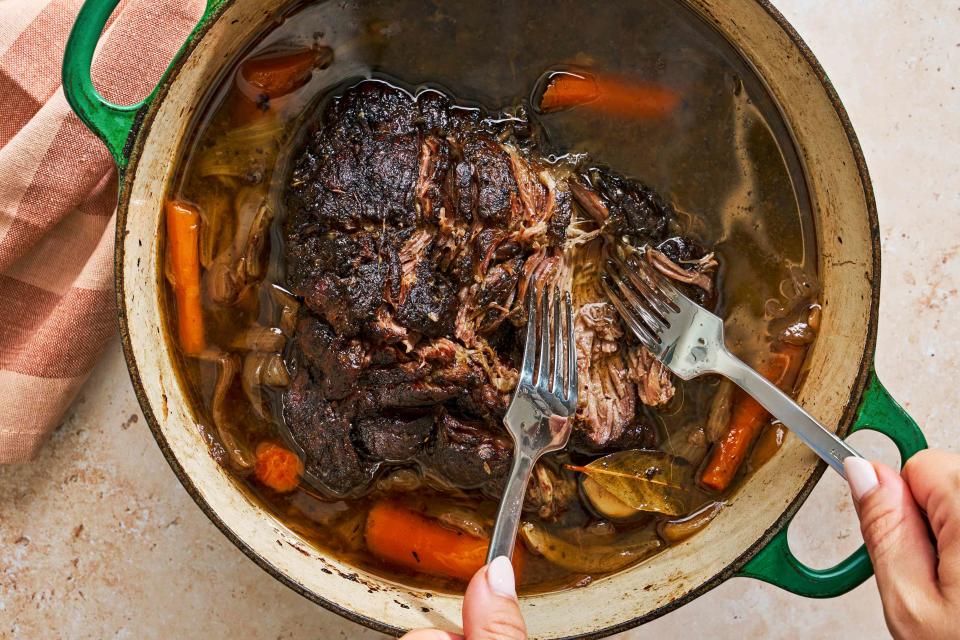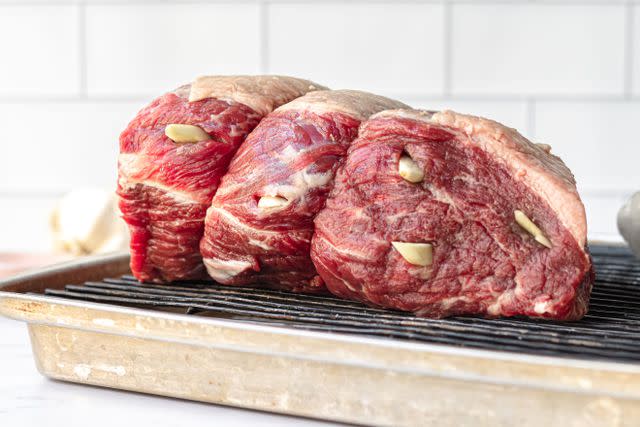Beef Chuck vs. Round: A Butcher Explains the Difference
Each is meant for specific recipes and cannot be used interchangeably.

Simply Recipes / Photo by Andrew Bui / Food Styling by Kaitlin Wayne
At home, it’s always an exciting evening when red meat is on the menu as a special treat my family doesn’t enjoy too often. This is because I try to source my beef from as reputable of a seller as I can and prepare it in a way that allows its rich, savory flavors to shine. And whether that’s through a long, slow roast or a quick, fast sear really depends on the cut of meat.
When it comes to cuts of beef, deciding what to buy can get complicated quickly. There are eight main “primal cuts” of beef and a variety of additional cuts can be taken from each of those, leaving you with dozens of purchasing options.
I'm here to nip some of that overwhelm in the bud by giving you all the need-to-know information on the differences between two of the largest cuts of beef: round and chuck.
What Is the Difference Between Chuck and Round Beef?
The main difference between chuck and round beef is where they’re sourced from on the steer.
“Chuck comes from the front shoulder and is full of flavor because of the amount of fat, bone, and connective tissue it contains,” says Scott Perkins, CEO and Butcher at The Bearded Butchers. Many popular cuts of beef are taken from the chuck, including roasts, short ribs, and flat iron steaks.
Meanwhile, the round is sourced from the rump of the steer. “The round is leaner and nearly boneless, so made up almost entirely of lean muscle with very little marbling,” Perkins explains. Top round (also known as the London Broil), eye of round, rump roasts, and sirloin tips are all sourced from this piece of meat.
Read More: Sirloin vs. Ribeye: A Butcher Explains the Difference

Simply Recipes / Ciara Kehoe
What Are the Best Uses for Chuck vs. Round Beef?
Because these two cuts of beef are quite different in terms of defining characteristics, they’ll be best utilized in contrasting dishes and are not interchangeable. “The two cuts vary greatly as the shoulder is roughly 50 percent muscle to bone, fat, and connective tissue, while the round is almost 90 percent muscle with little to no fat,” Perkins adds.
While the high percentage of fat and connective tissue found in chuck results in maximum flavor, it typically requires slower methods of cooking to avoid the risk of getting tough. These include slow roasts and stews; however, chuck is also commonly made into ground beef. Ground chuck is delicious in burgers, pasta sauces, meatballs, stuffed peppers, meatloaf, shepherd’s pie, tacos, stir-fries, enchiladas, and more.
“However, the flat iron, which is the second most tender muscle on a cow, is also found in the chuck,” says Perkins. The flat iron is best prepared with a quick, high-heat sear, where it can then be enjoyed as is or in salads, sandwiches, or quesadillas. This is one cut of chuck that could be used interchangeably with round cuts of steak.
Meanwhile, the leaner, high-yield (more muscle equals more meat) round cuts of beef are usually seared at a high temperature to lock in flavor and tenderness. If round steaks are cooked too long, they can often end up tough and chewy. Perkins explains that round steaks are delicious as is or in fajitas or even jerky. Whereas rump roasts are classically prepared as deli-style roast beef.
How To Pick the Best Cuts of Beef
When shopping for either chuck or round, Perkins explains that you want to look for similar features. “Look for cuts of meat with as much marbling (speckled fat throughout the meat) and as little bone as possible,” he explains.
You want to see uniform color throughout the cut, ranging from a bright red to a deep purple. Ideally, you want to steer clear of cuts that display a tepid brown color.
“Sourcing your meats from a local butcher is much preferred compared to a chain store,” Perkins adds. This allows you to get a better understanding of where the beef came from, how it was grown, and what cuts to choose for certain dishes.
The Best Way To Store Beef
Once your beef is home, you want to use it relatively quickly, within about three days. However, in airtight storage it can stay fresh for up to five days in the fridge. If you’re not going to cook it in that time, simply stick your cuts in the freezer. “If vacuum sealed, you can store chuck or round beef cuts in the freezer for up to one year,” Perkin says.
Read the original article on Simply Recipes.


